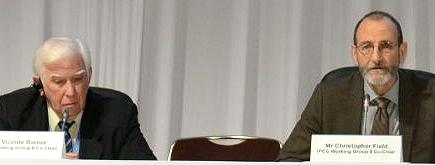政府間氣候變遷小組(IPCC)第二工作小組(WG2)31日在日本橫濱市發表第五次評估報告及決策摘要,彙整出氣候變遷對人類社會和自然系統的影響評估、未來的災害風險,以及可能的調適方案。
WG2新增議題、章節 聚焦因應措施
「這份報告探討氣候變遷已經造成的後果和未來可能產生的危險,涵蓋所有的地理區域和產業、從海洋到人類安全等各項議題。」第二工作小組的聯合主席、美國卡內基科學研究所Chris Field博士說。
第二工作組針對氣候變遷對水源、土地、海洋生態、糧食、都會區與農村、能源和工業、人類健康與安全、生計與貧窮的影響等議題進行評估。「報告聚焦於徹底瞭解問題以及找出有效的因應措施。」Field博士說。
第二工作小組報告整體佔的份量較過去幾次的評估報告增加了許多,並且為了探討氣候變遷調適相關的新議題,新增了10個章節;海洋議題在其中2個新章節佔了頗大的比重,其他的新增章節則納入生計、貧窮、人類安全、城鄉差異等議題,深入探討社會經濟、文化、地區計畫等談及氣候變遷不可忽視的面向。
氣候變遷帶來全球衝擊 沒有一國倖免
報告預測,氣候變遷將在未來數十年中增加糧食與水源短缺的風險以及連帶的社會衝突;若全球升溫2℃,極端氣候型態將導致全球年度GDP下降2%。
報告表示,單就觀察到的現象可以發現,最令人震驚的莫過於不管是熱帶還是極地,小島或大陸,最富裕的國家抑或最窮的地方,都可以找到氣候變遷的痕跡。
「氣候變遷正在全世界上演,但人類社會對此的應變措施卻遠不及格。」報告以此作結。
海洋酸化、海面上升、全球升溫是主要衝擊
報告草稿摘要指出,海洋溫度將持續上升,影響海洋的生產力、魚群數量和沿海漁業社群的生計。摘要也預測,部分熱帶地區的漁業資源將減少達60%,尤其是非洲地區。
報告警告,長期下來,海平面上升預計可能淹沒15%的太平洋島嶼。到了2100年,部分亞洲城市很可能因海平面上升而變成沼澤,其中加爾各答、孟買、達卡、上海、曼谷、胡志明市和仰光等城市最危險。
報告也指出,海洋酸化和暖化將嚴重影響珊瑚礁生態。大氣中二氧化碳濃度430~480ppm已是勉強維持珊瑚礁健康的上限。
自從18世紀末的工業革命以來,全球平均溫度已至少上升0.6℃,大氣中二氧化碳濃度已經從280ppm增加到2013年的400ppm,幾乎是以1年2ppm的速度在增加。
全球氣溫上升將造成更嚴重的都市空氣汙染和更頻繁的森林大火;暖化的北極到了本世紀中,將有長達125天的無冰期,大開物流運輸和資源開採之門。報告指出,人類適應乾旱、洪水和極端氣候的能力有限,就目前大氣中的溫室氣體濃度來看,人類將無可避免地陷入苦戰。
因應措施隨時間更加緊迫、艱難
如同過去所有的IPCC報告,這份報告也強調因應措施和減碳的重要,以避免更嚴重的災情。第二工作小組的共同主席,來自阿根廷的Vicente Barros博士表示,「我們身處於『人造氣候變遷』的時代,任何投資的前期評估工作越是完善,就越有能力替我們的現在和將來付利息。」
在聯合國氣候變化綱要公約(UNFCCC)之下,世界各國政府正合作談判,以期在2015年前討論出新的全球溫室氣體減量協議或其他具法律效力的結果,並於2020年後實施。
AR5分四部曲 10月完成總體報告
第二工作小組的報告並非蒐集最新研究,而是統整過去已經完成的研究結果,由數百位氣候科學專家自願貢獻心力、歷時4年時間完成,是IPCC第五次評估報告(AR5)四部曲的第二部。
第一部由第一工作小組(WG1)負責,檢視氣候變遷的物理科學基礎,於2013年9月完成。第一工作組科學家發現,人類有95%的機率是1950年代以降全球暖化現象的元凶。科學家們表示,不管在陸地上、大氣中還是海洋裡,全球暖化都是無庸置疑的。
第三工作小組(WG3)負責評估氣候變遷的緩解方法,報告將於今年4月完成。所有的AR5評估報告將統整成一份完整報告,預計於今年10月完成。
Fast-rising sea levels, declining fisheries, more air pollution and an ice-free Arctic summer are projected by scientists and government representatives from around the world meeting now in Yokohama to finalize the latest assessment of climate change impacts on human and natural systems.
This report by Working Group II of the Intergovernmental Panel on Climate Change, IPCC, covers options for adaptation, and the interactions among climate changes, other stresses on societies and opportunities for the future.
Initial drafts of the report leaked to the media project that climate change will increase the risk of food and water shortages and related social conflicts in the coming decades.
“This report considers consequences of climate changes that have already occurred and the risks across a range of possible futures. It considers every region and many sectors, ranging from oceans to human security,” said Dr. Chris Field of the Carnegie Institution for Science in the United States, who serves as co-chair of Working Group II.
Working Group II is reporting on the impacts of climate change on freshwater resources, land and ocean ecosystems, coasts, food, urban and rural areas, energy and industry, human health and security, as well as livelihoods and poverty.
“The focus is as much on identifying effective responses as on understanding challenges,” said Dr. Field.
A draft of the summary shows that rising ocean temperatures will continue, affecting ocean productivity, fish populations and the livelihoods of coastal fishing communities. The draft projects the loss of fisheries of up to 60 percent in some tropical zones, particularly in Africa.
Rising sea levels are likely to swamp some of Asia’s largest cities by 2100, with Calcutta, Mumbai, Dhaka, Shanghai, Bangkok, Ho Chi Minh City and Rangoon among those at greatest risk.
Sea level rise could inundate an estimated 15 percent of Pacific islands over the long term, the report warns.
The draft indicates that ocean acidification and warming will hit corals hard. Survival of even moderately healthy coral reefs is consistent only with scenarios in the 430-480 parts per million of carbon dioxide, CO2.
Since the Industrial Revolution, the atmospheric concentration of CO2 has increased from 280 ppm to 400 ppm as of 2013. It is currently rising at a rate of two ppm a year and accelerating.
Rising global temperatures will result in more urban air pollution and bigger wildfires, the report will show.
A warming Arctic will be ice-free for as long as 125 days a year by mid-century, opening the region for commodity shipping and resource exploitation.
The report acknowledges limits to human ability to adapt to all the projected droughts, floods and extreme weather events – suffering is inevitable, considering the concentration of greenhouse gases already in the atmosphere.
As all previous IPCC reports have done, this report will urge the need for adaptation and carbon emissions reductions to avoid much worse disruptions.
This assessment comes as world governments are negotiating under the UN Framework Convention on Climate Change to deliver a new and universal greenhouse gas reduction protocol, legal instrument or other outcome with legal force by 2015 for the period beyond 2020.
This meeting of Working Group II is the culmination of four years’ work by hundreds of experts who have volunteered their time and knowledge of climate science. Their report is not new research, but instead gathers and reports on research already conducted.
On Monday, March 31 the Summary for Policymakers will be released to the public, along with the draft full report.
This report is part two of a four-part assessment, known as the Fifth Assessment Report, AR5.
The first part, by Working Group I, dealing with the physical science basis of climate change, was finalized in September 2013. This group of scientists found with 95 percent certainty that humans are the “dominant cause” of global warming since the 1950s. On land, in the atmosphere and in the oceans, global warming is “unequivocal,” they stated.
The Working Group III contribution, assessing mitigation of climate change, will be finalized in April. The Fifth Assessment Report will be completed by a Synthesis Report in October.









